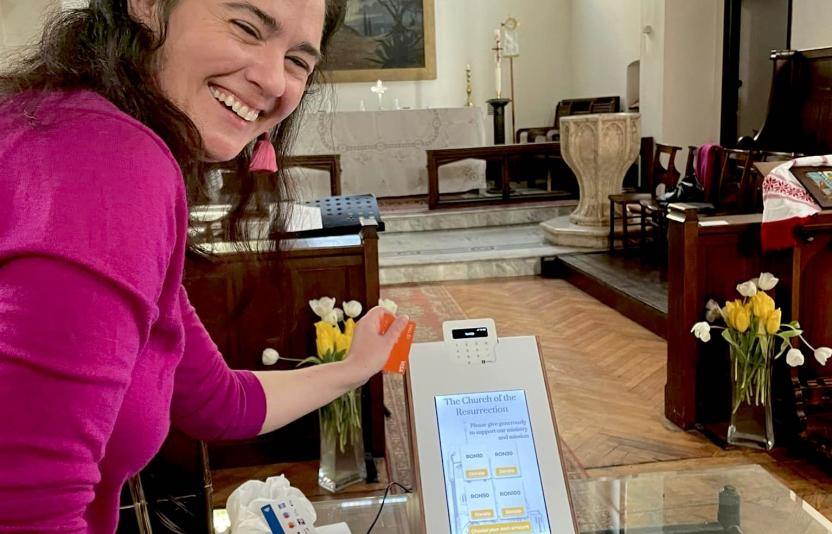Bishop Robert's Easter Message 2018

God was in Christ reconciling the world to himself (2 Cor. 5:19)
It is of the nature of this ‘Easter Message’ that it is written, published and mostly read in Lent, well before Easter. So I invite us to think about the joy of the resurrection in the context of the events leading up to the crucifixion of our Lord.
In the celebration of the Church’s liturgy there is the greatest dramatic distance between Good Friday and Easter Sunday. On Good Friday we recall the arrest of Jesus, Peter’s betrayal, the trials before Pilate and Herod, the baying crowd demanding crucifixion, the scourging and crucifixion. These are all events which depict the darkest aspects of human nature and which are appropriately expressed in sombre reflection and meditative music. Easter Sunday is a complete contrast centring on a garden tomb, a stone rolled away and the presence of angels impelling us to declare with organ and trumpets: ‘Thine be the glory, risen conquering Son: endless is the victory thou o’er death hast won.’
It would, however, be very far from the case to suppose that Easter Sunday simply cancels out holy week and Good Friday. It is not as if God somehow switches on a light that turns night into day, so that fortunate Christians can now live in a peaceable world where love, life and grace simply dissolve all the disfigurements of human sin and evil. Instead, what we see in the pages of the New Testament, are the implications of Easter Sunday being progressively and challengingly worked out in the lives of individuals and communities. The church is born as people work out an answer to the question: ‘What does it mean that the Jesus who was deserted and executed is alive with God and also present with us who follow him?’
The gospel writers show in different ways how the resurrection is good news for human beings – precisely including those who were complicit in Jesus’s death. St. Luke especially links the resurrected Christ with the city of Jerusalem – the place where Herod, Pilate, Jews and Gentiles joined forces to kill the messiah (Acts 4:27). In Luke’s gospel, the ‘road to Emmaus’ turns out to be a journey back to Jerusalem (Luke 24:33), Jesus appears to the 11 as they eat a meal together in the city, and the action finishes with the disciples worshipping together in the Jerusalem Temple. Extraordinarily, Peter’s sermon in Solomon’s Collonade suggests that the people of Jerusalem, including their leaders, had acted in ignorance (Acts 3:17) and extends an offer of salvation to any who will repent. Just where you might have expected a message that celebrated Jesus’s victory ‘over’ the Jerusalem set, we see a remarkable attempt to ‘win over’ Jerusalem.
Peter himself, of course, had colluded in Jesus’s death, three times denying his Lord. It is St. John who describes in painful detail Jesus’s reinstatement of the ‘rockman’ – probing deeply into the extent of Peter’s love for his master, before reissuing the summons ‘follow me’. The other ‘pillar’ of the early church, Paul, had persecuted Christian believers, to the point of death, and he too must be challenged and ‘turned around’ in order to be saved (Acts 9:4). For Paul this involves an experience of physical blindness and a deeply humbling re-orientation of his core beliefs and practices.
It is with personal experience that the now ‘Saint’ Paul, tells us that ‘God was in Christ reconciling the world to himself.’ This is seen nowhere more clearly than in a crucified Christ who reconciles precisely those who had hurt him. The perfect victim grants absolution to his persecutors. In the face of humanity’s misguided attempt to annihilate the messiah, God overcomes the forces of evil and death in order to reconcile humanity to its creator. And God puts this resurrection power to work in the lives of individuals to bring them back to himself.
I have begun to think in recent years that the gospel does not just contain the message of reconciliation: the gospel is the message of reconciliation. That means the gospel of Easter Sunday is at work in the very earthly and all too human Monday to Friday realities of life persuading us, coaxing us and sometimes dragging us to face those things in our lives which separate us from God and from one another. And it means that all who are involved in the messy, costly and demanding work of reconciling people to each other and to God are doing God’s own work.
We inhabit a world that is deeply marked at the moment by sharp and polarising divisions. The kind of passion, anger and even hatred that was manifest in Holy Week is sadly and increasingly evident in the social media, in newspaper columns and in certain kinds of political and even ecclesiastical discourse. The Bridge Builders conflict resolution consultants talk about ‘level 5’ or ‘holy war’ conflicts where only the annihilation of the other will satisfy.
As we approach Easter, I am thankful that the love of God reaches down to the point of our deepest need. God in Christ takes upon himself the enmity, insults and blows of our sinful humanity and responds with the gracious offer to forgive and to reconcile. On Easter Sunday God demonstrates that he will not be defeated in his efforts to renew and redeem his creation. Each time we overcome the sin that separates people from their creator and from each other we prove the ongoing power of the resurrection.
‘No more we doubt thee; glorious Prince of life. Life is naught without thee: aid us in our strife. Make us more than conquerors through they deathless love. Bring us safe through Jordan to thy home above.’
And finally, I give my thanks as ever to all our clergy and lay people who will be involved in the preparation and conduct of worship for Holy Week and Easter. May God powerfully bless the words spoken and sung in our churches.
I wish you a blessed and joyful Easter,
+Robert Gibraltar in Europe
Pdf text version of Bishop Robert's Message.


